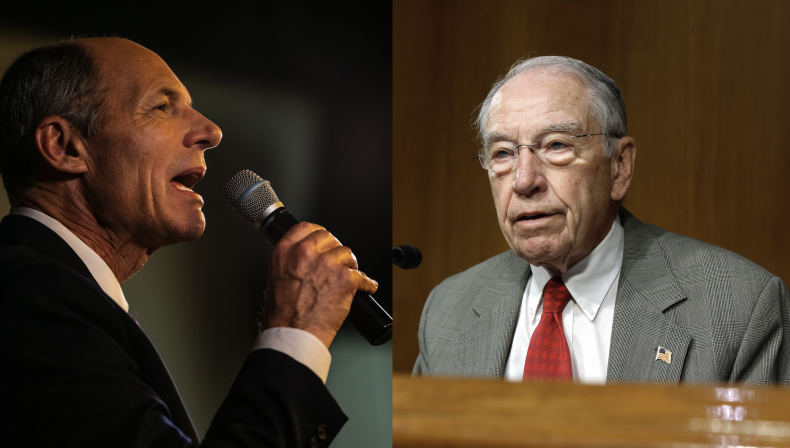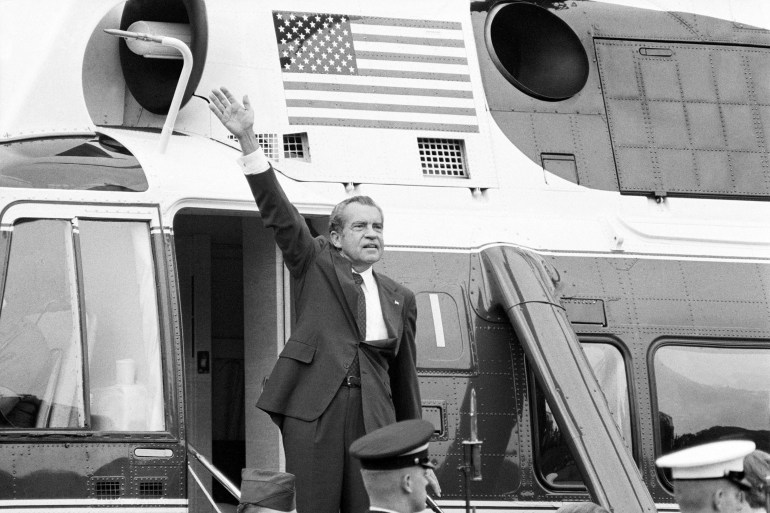Far too many in the United States have concerned themselves with assigning blame for the fascist space in which the US finds itself. For nearly six years, “Oh but those emails!” has been the social media shorthand for shivving Americans who either did not vote in the 2016 presidential election or voted for a candidate other than Hillary Rodham Clinton or Donald Trump.
With the ongoing January 6 hearings in the US House of Representatives, the question of how the US devolved to this moment remains all about Trump and 2016. Experts and common Americans alike have been short-sighted (or really, Trump-sighted) in their explanations for how the US took a glide path towards far-right corruption.
Journalist and cultural anthropologist Sarah Kendzior in particular has done some wonderful work in predicting the rise of Trump and explaining the kleptocratic nature of his rise, including her book Hiding in Plain Sight. To Kendzior and others’ credit, they do occasionally mention Ronald Reagan or cite the US Supreme Court’s Bush v Gore decision (which handed George W Bush the presidency in 2000) in understanding how American leaders groomed the US for Trump. But they do not further explore the path that has taken the US and its democracy to the edge of an abyss.
It was at least 50 years ago that the attempts of another administration to alter a potential election outcome first exposed themselves. Indeed, Trump’s televised attempt to steal a presidential election by force was not something entirely new, but only a variation on the theme of “dirty tricks” dating as far back as President Richard Nixon.
With the 50th anniversary of The Plumbers’ Democratic National Committee break-in at the Watergate complex having passed on June 17, many Americans will recognise the most famous attempt to steal a presidential election in US history prior to January 6, 2021. More than a few Americans understood at the time the dangers to American democracy Nixon and his 1972 campaign operatives posed, especially in covering up their spying, wiretapping, and disinformation operations against Democratic candidates.
My own memories as a four-and-a-half-year-old are tied up with Nixon’s televised announcement at 9pm on Thursday evening, August 8, 1974, announcing his formal resignation from office.
It started because of a traumatic injury. My mom was cooking in the shared kitchen of our second-floor flat, making some kind of chicken dish. She had the oven door open, having just taken the chicken out of it and having placed it on the stove. I tried to climb up to the top of the stove to get a taste by using the open oven door as a stepstool, and I scorched the outside of my right calf. The skin around the burn area was gone (it was a pretty good second-degree burn), leaving a white circular burn mark. Mom applied ointment and a bandage and made me take two Bayer aspirins for the pain.
Still crying in pain from the shock of seeing, smelling and feeling my skin being seared in the kitchen, I plopped down on the couch in the living room, which was slightly to the right of the TV. A man with a hogshead kind of head appeared on the 19-inch Quasar colour television screen, a man I vaguely knew as President Nixon. I recall mom shaking her head, and Walter Cronkite calling it a “sad time” for the country. Nixon seemed as sad and pitiful as I felt that evening, as the rest of the US probably felt, too. I didn’t understand everything I saw, of course. Words like “impeachment”, “hearings”, and “resignation” were well beyond the vocabulary of a kid a month away from starting kindergarten. But I saw what I saw, and for more than just a few moments.
For the past 48 years, I have had flashbacks to those moments. With that, I was encouraged to learn more about what was then the unprecedented level of political corruption Nixon brought with him to the White House and sustained for more than five years as president. The worst part of Watergate and the unearthing of all the corruption that followed was what occurred after Nixon resigned from office on August 9, 1974. A month later, newly installed President Gerald Ford issued his Proclamation 4311, pardoning Nixon for any and all crimes in which he played a role.
Ford’s reasons? “As president, my primary concern must always be the greatest good of all the people of the United States whose servant I am … My concern is the immediate future of this great country,” Ford said in his speech defending his decision. So much for, “My fellow Americans, our long national nightmare is over,” which was what Ford had said a month earlier upon taking the oath of office.
Ford’s decision to pardon Nixon for his illegal activities in undermining his Democratic opponents and then covering up those activities was short-sighted, craven, and narcissistic. Ford let Nixon and everyone convicted for their role in Watergate off the hook, prolonging the “national nightmare” to the present day. The decision to not punish the ringleader of the greatest attempt to break America’s democracy at that time would lead to greater corruption and ever more brazen scandals.
One can draw connections deriving from Nixon and Ford to Iran-Contra, to Bush v Gore, to Citizens United and the ever-increasing amounts of dark money in American elections, to Trump, and now to the January 6 hearings.
With such a hyper-focus on Trump’s rise, though so many have discounted the glide path that has led to the January 6 hearings, and with it, the serious doubt that Trump will ever be punished for his fascist deeds. And that will likely embolden him and others to try again. Despite what experts like Sarah Kendzior and others have written in recent years, the lurching of the US towards corruption and fascism was never “hidden in plain sight” at all.
This flight towards perdition began as a response to expanding civil and human rights for Black folk and white women and as an answer to the quagmire Vietnam had become politically for cold warriors looking for economic access to mainland China. Far-right forces have blinded Americans and the rest of the world with their penchant for unvarnished and craven brazenness. They have dared progressives and leftists to call them out for their wilful ignorance, corruption, and bald-faced lies, in 1968, in 1972, and in 2022. Trump and his corruption of American politics, his wannabe fascism, and the merry band of kleptocrats he leads, his rise is but the latest danger in a representative democracy heavily influenced by white male demagoguery. The belief that electing Hillary Clinton in 2016 would have reversed this 50-year-plus trend is as delusional as believing the fundamentals of America’s political institutions remain strong.
The views expressed in this article are the author’s own and do not necessarily reflect Al Jazeera’s editorial stance.













